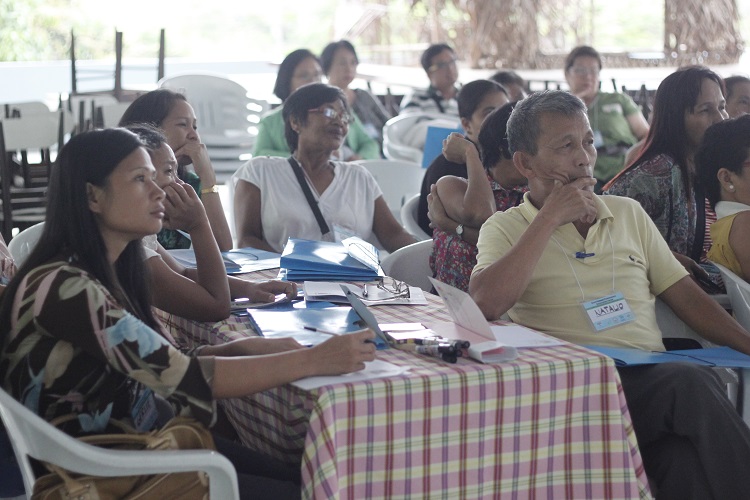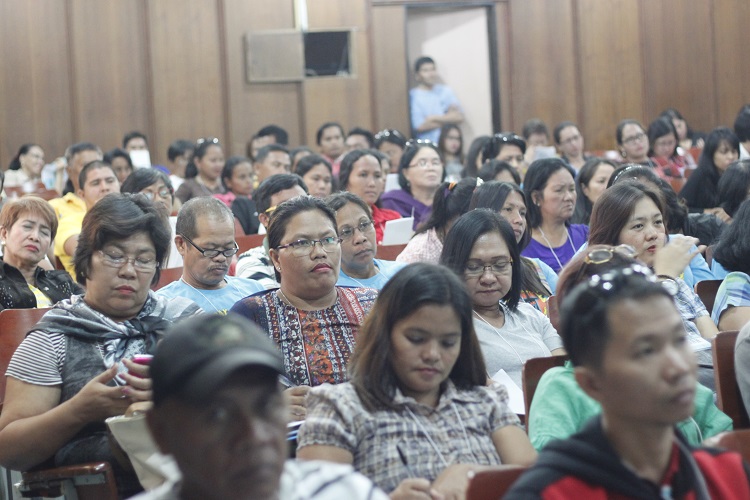SHARING OF EXPERIENCES. The homeowners association officers of the 24 resettlement sites in Cagayan de Oro City draw together at the CDO Resettlement Homeowners Association (RHOA) forum to share and discuss challenges, lessons and opportunities. Photo supplied by XEP.
By Niña Bea Cadorna
The homeowners association (HOA) officers of the 24 resettlement sites in Cagayan de Oro City gathered for a forum at the Southeast Asia Rural Social Leadership Institute (SEARSOLIN) on February 27, to share their best practices and norms, and discuss the issues on governance and policy-making within their communities.
The Xavier Ecoville Project management team initiated and organized the CDO Resettlement Homeowners Association (RHOA) forum with the help of Habitat for Humanity and the city’s Shelter and Housing Development Multisectoral Task Force. This is the first time that a forum was organized specifically for the HOA officers of the resettlement communities.
“Due to the increasing numbers of resettlement communities, it is high time to consolidate the issues and initiatives of the homeowners association and, at the same time, to develop linkages among its officers and other private and public sectors to strengthen their governing power in the community,” said RHOA’s forum director Jason Jay Dalman.
With the theme “Pagpalig-on sa HOA: Ang Pag-amuma sa Pundasyon ug Kaugmaon sa Komunidad [Strengthening HOAs: Caring for the foundation and future of the communities],” Dalman said the event is “timely and relevant because of the necessity to promote and operationalize the best practices and norms of good governance in homeowners associations.”
Strengthening governance
Housing and Land Use Regulatory Board (HLURB) regional director Charito Raagas gave a plenary talk on the roles and functions of the homeowners association in a community. She also gave an orientation on the process and requirements of registration of the HOA with the HLURB.
HLURB is a national government agency tasked as the planning, regulatory and quasi-judicial body for land use development and real estate and housing regulation.
Republic Act 9903 or the Magna Carta for Homeowners and Homeowners Association stipulates the people’s right to form organizations and associations to fulfill their roles in serving the needs and interests in their communities.
To uphold this law, the leaders of a resettlement community must form their own HOA and sectoral groups as a way of governing and sustaining their community.
Out of the 24 participating RHOAs, only three of them, namely, Lutheran Village, Gawad Kalinga Shell Village Kapitbahayan, and Xavier Ecoville Homeowners Association, have been duly registered with the HLURB.
Raagas emphasized the need of by-laws to regulate the HOA. The by-laws comprise the HOA’s declaration of purpose, name, location, membership, fees, dues, board of directors, electoral process, and officers’ terms of office as agreed upon by the officers. HLURB registration is compulsory to ratify the by-laws.
“Kinahanglan ang tinabangay ug pagkahiusa sa HOA. Kung naa’y dili pagkasinabot, wala’y order ang association [There should be unity among the members of the HOA. Without concessions, there will be disorder within the association],” Raagas said.
STRENGTHENING THEIR ROLES. Participants from the resettlement sites in CDO listen to the talks on the roles of HOA in the community, the Republic Act 9903 (Magna Carta for Homeowners and Homeowners Association) and the registration of HOA to the Housing and Land Use Regulatory Board, among others. Photo supplied by XEP.
One step at a time
Another speaker and consultant Ermin Stan Pimentel spoke about the roles and functions of the city housing task force in resettlement communities. He also talked about the seven emerging concerns within communities which the resettlement communities identified from the previous CDO housing summit: (1) security of tenure, (2) land acquisition, development and house construction, (3) livelihood and employment, (4) health, education and environment, (5) public safety, peace and order, (6) infrastructure and basic services, and (7) creation of city housing development and strengthening of HOAs.
With these development hurdles, Pimentel accentuated that people need to have a mature perspective of what politics is. “Taason nato ang lebel sa paglantaw nato sa politika tungod kay sa demokrasya nga pang-gobyerno, ang politika dako’g impluwensya sa pag-gama og mga programa nga makatabang sa atong komunidad [We should broaden our view of politics because in a democratic government, politics holds great influence in creating programs that can help our communities],” Pimentel said.
He also suggested the need for a separate department that can focus on and cater to the needs and concerns of the resettlement communities. Although this will entail a long process and dialogues with the local government and other stakeholders, it can be done one step at a time.
Jonna Fugoso, a forum participant from Balangaw sa Kalinaw Village, Indahag, said that she learned a lot from the forum especially on the roles of HOA in the community, and wished that more time could be given to it.
“Kulang ra ang usa ka adlaw nga forum. Mas maayo siguro nga duha ka-adlaw para mas mapalawom ang among kahibalo mahitungod sa mga polisiya sa pagdumala sa HOA [One day is not enough for the forum. It might be better to conduct it for two days so we can deepen our understanding on managing our HOAs],” Fugoso said.
Another participant from GK Shell Kapitbahayan Village, Calaanan, Agustina Bohol, said that one of the keys to sustainability is the cooperation of HOA members.
“Kinahanglan magtinabangay, magsinabtanay ug magdinasigay ang mga HOA members [The HOA members must help each other, understand each other and encourage each other],” Bohol said.
CDO Mayor Oscar Moreno, who also visited the forum, expressed his gratitude to the organizers for initiating the event and hoped that the forum will be continued in the years to come.

